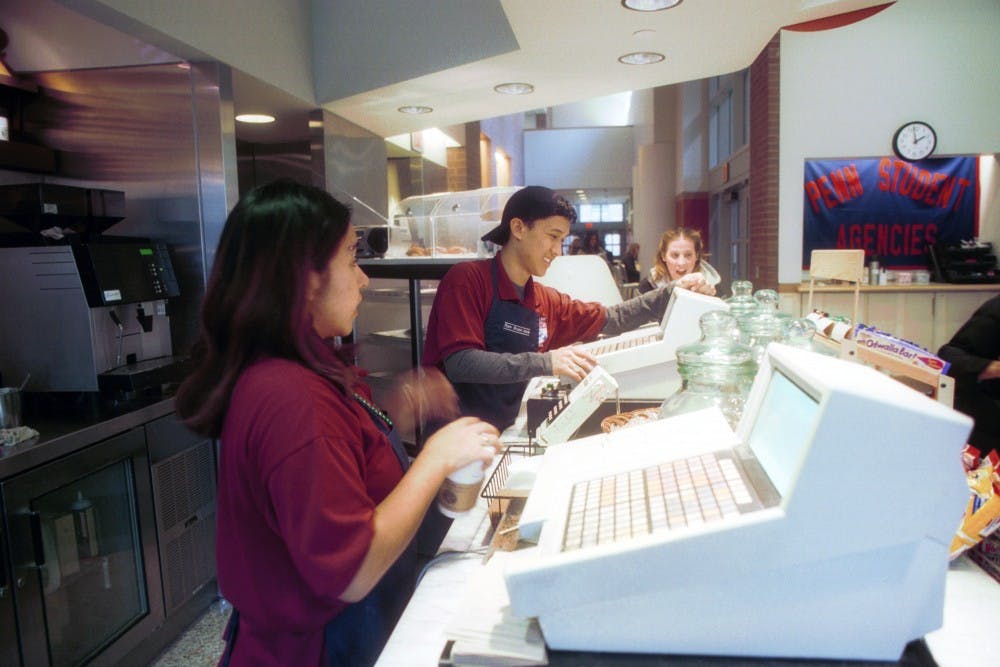
File Photo
While Yale students protested student income contributions to financial aid outside their president’s office, Penn students contribute gladly.
One hundred Yale protesters argued that by asking low-income students to work a job to pay their tuition, Yale’s administration was dividing its students along socioeconomic lines. While some Penn students share similar concerns, others feel that Penn’s work-study grant system, which asks students to take jobs during the academic year to pay part of their tuition, is fair.
“A lot of the discussion has been about how [student income contributions] create two classes of Yale students: those who pay and those who don’t,” said Tyler Blackmon, a Yale College Council member who spearheaded Yale’s effort to eliminate student income contributions. “Some students have to take out loans to afford it or take a second job and that oftentimes means you can’t do as many extracurriculars or have to drop a class.”
Some of Penn’s 2,900 undergraduates on work-study have expressed similar concerns, calling Penn’s work-study requirement a limiting factor in campus involvement.
“I can barely handle 5.5 credits; having a job on top of that is not that fun,” said College freshman Rita Wegner, who worked two work-study jobs last semester but left one this spring to accommodate her bigger course load.
Wegner and others are particularly concerned that even with work-study jobs, they have difficulty earning the full amount of their work-study grants, which typically account for up to $3,300 of tuition expenses. College freshman Stephanie Alexiev, for example, works every week at a lab but only makes $8 per hour. Wegner and Alexiev will cover the difference between their incomes and grants with loans.
Pay at or slightly above the minimum wage is the norm on Penn’s campus, making it difficult for students to pay off their work-study grants. A student working at $8 per hour would have to work ten hours per week over the course of the forty-week academic year to cover a $3,000 work-study grant.
“You’re given work-study because you need the money, so they should be a little more generous with their hourly wages,” Wegner said.
A second reason why undergraduates, particularly freshmen, have difficulty fulfilling their work-study grants is that jobs can be hard to find. Students sometimes have to apply to nearly a dozen jobs before finding an employer that is responsive and still hiring.
Nonetheless, these students and others disagree with Yale protesters’ discontent. Of eight work-study students interviewed, all said that they believed Penn’s work-study requirement is fair.
“If you’re already maxed out on federal loans ... I feel like it’s only helping you out if they give you more money you can earn through work,” Alexiev said.
Students cited three main benefits of work-study grants.
First, they allow students to gain skills. Wegner said her job at a cafe is teaching her how to run a business and how to work with customers and teams. Nursing freshman Phil Ezeala said his work-study job is equipping him with administrative skills.
Work-study jobs can also act as springboards for career exploration. College freshman Monica Phann, who has two work-study jobs, said her job at the Children’s Hospital of Philadelphia has inspired her to transfer to Penn’s School of Nursing and pursue a career in a hospital.
“I’ve been lucky in that both of my work-studies are academically related ... I think work-study has given students opportunities to explore careers,” Phann said. “It isn’t a burden for college students if they seek out a work-study job related to what they might want to do in the future or something they’re passionate about.”
Finally, work-study jobs can teach students financial independence.
“I think that work study is a good thing,” College freshman Aaron Kelley said. “I don’t take anything for granted. I feel very blessed that Penn gave me as much money as they already gave me, and I feel like working and helping them out a little bit is my duty. I feel like I should give a little bit back.”
The Daily Pennsylvanian is an independent, student-run newspaper. Please consider making a donation to support the coverage that shapes the University. Your generosity ensures a future of strong journalism at Penn.
DonatePlease note All comments are eligible for publication in The Daily Pennsylvanian.





